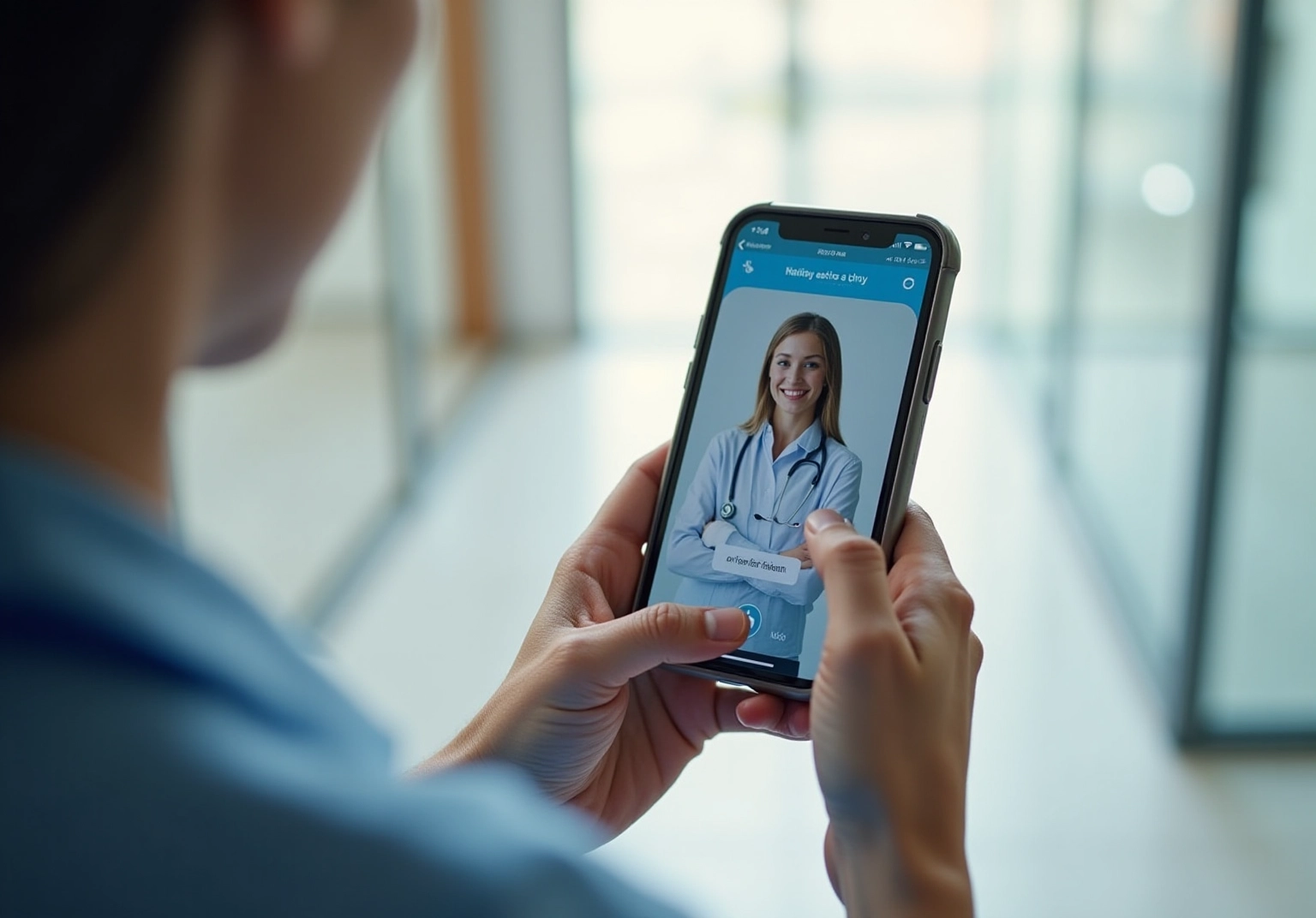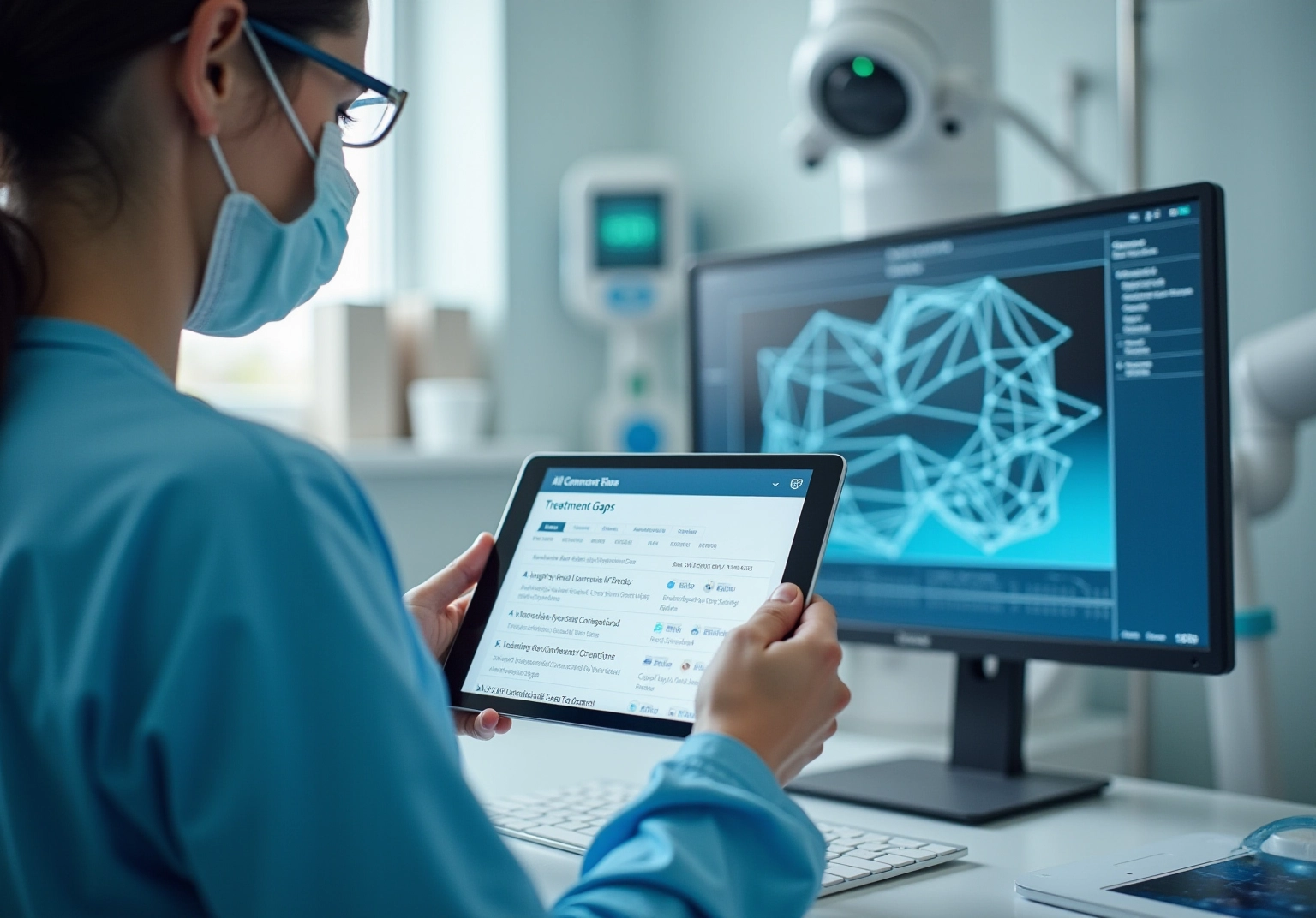
This article underscores the transformative impact of ten AI applications in healthcare, which are revolutionizing patient care by enhancing efficiency, accuracy, and outcomes across a range of medical services. Each application illustrates how advanced AI technologies—such as predictive analytics, natural language processing, and robotic surgery—significantly improve diagnostic capabilities, streamline administrative workflows, and promote proactive patient engagement. Ultimately, these advancements lead to superior healthcare delivery and heightened patient satisfaction.
In the rapidly evolving landscape of healthcare, artificial intelligence is emerging as a transformative force, reshaping the delivery and optimization of patient care. By streamlining coding processes with the Inferscience HCC Assistant and enhancing diagnostic accuracy through IBM Watson Health’s imaging solutions, AI technologies are paving the way for improved efficiency and outcomes.
As healthcare providers grapple with increasing demands and complexities, innovative tools such as Google Health’s predictive analytics and Babylon Health’s virtual assistants are proving invaluable in anticipating patient needs and enhancing engagement.
This article delves into the myriad ways AI is revolutionizing healthcare, showcasing how these advancements not only address operational challenges but also ensure that patient care remains at the forefront of medical practice.
The Inferscience HCC Assistant addresses a critical challenge in healthcare: the inefficiency of HCC coding. This innovative tool uses AI applications in healthcare, along with advanced artificial intelligence and natural language processing, to automate the coding process, significantly reducing the time and effort required by medical providers. By conducting real-time analysis of clinical data, it delivers precise coding suggestions that enhance both accuracy and compliance. This capability is essential within the CMS-HCC model, which closely links reimbursement to the quality and complexity of services provided. Consequently, healthcare organizations can anticipate improved Risk Adjustment Factor (RAF) scores, maximizing funding from Medicare Advantage contracts.
Moreover, the HCC Assistant streamlines workflows, allowing providers to focus more on patient care, ultimately enhancing organizational efficiency. Recent advancements in AI applications in healthcare, especially in natural language processing, are poised to further refine coding solutions, leading to better outcomes for individuals through enhanced data interpretation. Real-world applications have demonstrated that AI applications in healthcare can reduce claim denials by 40% and speed up billing turnaround times by 25%. These statistics underscore the transformative potential of the HCC Assistant in the medical field, positioning it as an indispensable resource for healthcare organizations seeking to optimize their operations.

IBM Watson Health harnesses the power of artificial intelligence to revolutionize the analysis of medical images, significantly enhancing diagnostic accuracy and expediting the interpretation process for radiologists. By employing advanced machine learning algorithms, Watson identifies intricate patterns and anomalies within imaging data that may elude human detection. This capability is particularly crucial in high-pressure scenarios, such as oncology and emergency medicine, where timely and accurate diagnoses can dramatically influence patient outcomes.
Recent statistics reveal that 83% of physicians consider AI applications in healthcare a crucial solution to address administrative burdens and burnout, underscoring the increasing dependence on AI technologies in the medical field. Inferscience’s HCC Assistant exemplifies how technology can transform medical risk adjustment by streamlining HCC coding workflows and improving Medicare Advantage funding. By employing advanced natural language processing (NLP), the HCC Assistant reduces manual effort in coding, allowing providers to efficiently ingest, analyze, and unify structured and unstructured data within their EHRs.
This procedure not only assists in recognizing neglected health diagnoses to improve RAF scores but also guarantees that providers obtain maximum funding from Medicare Advantage agreements, enabling them to concentrate more on client support. Moreover, Inferscience’s dedication to data security, demonstrated by their SOC2 Type II certification, establishes them as a reliable partner in the medical sector.
As AI diagnostics advance, the incorporation of AI applications in healthcare, such as IBM Watson Health and Inferscience’s solutions, is poised to transform benchmarks in radiology and risk adjustment, ensuring that providers can offer excellent service with improved efficiency. As stated by Jagney Dave, Vice President of Client Engagement at Inferscience, ‘AI is not solely focused on enhancing technology; it aims to revolutionize how we handle care for individuals and operational efficiency.
Google Health leverages AI applications in healthcare to utilize AI-driven predictive analytics for scrutinizing extensive datasets, empowering medical professionals to pinpoint individuals at risk for chronic conditions. This foresight facilitates the implementation of preventive strategies, significantly enhancing outcomes for individuals while curbing medical expenses. By anticipating potential wellness concerns, providers can shift to a proactive care model that aligns with value-based care principles, prioritizing outcomes over service volume.
As the population ages—projected to see the number of individuals aged 80 and older triple by 2050—the significance of such predictive capabilities becomes increasingly paramount. Furthermore, the use of AI applications in healthcare, specifically AI-driven virtual medical assistants, has demonstrated their efficiency by managing up to 70% of routine inquiries, enabling staff to concentrate on the more complex needs of individuals.
The integration of AI applications in healthcare not only streamlines operations but also fosters a more responsive healthcare environment, ultimately benefiting both providers and individuals.
Babylon Health has revolutionized access to medical guidance through its AI applications in healthcare, providing swift support for individuals seeking health information. These advanced assistants excel in triaging symptoms, directing users to appropriate care pathways, and enhancing user involvement. By significantly reducing unnecessary visits to medical facilities, Babylon Health’s technology optimizes resource utilization and elevates overall patient satisfaction.
Notably, recent statistics reveal that 83% of physicians believe that AI applications in healthcare can effectively mitigate challenges such as administrative overload and burnout, highlighting the transformative potential of these virtual assistants in modern healthcare.
As Jason Szczuka insightfully notes, “The way I perceive the potential of digital well-being and where, as a community, we have not enhanced it yet, is the expansion of the true provision of excellent support in the more convenient, connected and consistent platforms.”
Moreover, the integration of AI applications in healthcare for client engagement has yielded promising advancements, with studies indicating a significant rise in interaction and satisfaction levels. As the medical field continues to evolve, the impact of Babylon Health’s virtual health assistants on individual involvement remains a pivotal factor in enhancing care delivery.

Intuitive Surgical stands at the forefront of robotic surgery, leveraging AI to enhance the capabilities of its da Vinci surgical system. AI algorithms assist surgeons by providing real-time data and analytics during procedures, thereby improving precision and minimizing the risk of complications. This integration of AI not only enhances surgical outcomes but also facilitates minimally invasive techniques, resulting in quicker recovery periods for patients.
As Maitrayee Dey observes, “Each ongoing investment in robotics seeks to change healthcare into assisting extinction to a degree by reducing the number of human mistakes, boosting productivity, and helping to improve experiences for individuals.” This perspective underscores the vital role that AI applications in healthcare play in enhancing surgical accuracy and overall healthcare.
Recent advancements in AI-driven robotic surgery are revolutionizing the landscape of minimally invasive procedures. For instance, surgical interventions have demonstrated a reduction in morbidity and mortality rates associated with conditions like stomach cancer and obesity, affecting over 400,000 individuals suffering from morbid obesity.
Looking ahead, the future of surgical robotics is poised for further innovation, characterized by compact robotic setups and the potential for Metaverse-facilitated training. These developments are anticipated to enhance performance, productivity, and accessibility, making robotic assistance a viable option for a broader range of medical procedures. The European Union’s active promotion of robotics integration and funding initiatives is likely to foster collaboration among stakeholders, paving the way for even more advancements in this field.
Expert insights suggest that continued investment in AI applications in healthcare will not only minimize human errors but also significantly enhance patient experiences, solidifying the role of AI applications in healthcare for the future of surgical precision and outcomes. Additionally, while Intuitive Surgical leads the market, competitors like Medtronic and Smith & Nephew are also making significant strides in robotic surgery, contributing to a dynamic and evolving landscape.

Atomwise is at the forefront of revolutionizing the drug discovery process through AI applications in healthcare, significantly accelerating the identification of potential therapeutic compounds. By harnessing deep learning algorithms to analyze molecular structures and predict interactions, Atomwise effectively demonstrates the impact of AI applications in healthcare by streamlining the development of new drugs, thereby reducing both the time and costs typically associated with traditional methods. This groundbreaking innovation, particularly through AI applications in healthcare, is pivotal in addressing urgent health crises and facilitating the rapid development of effective treatments. As Christoph Meier aptly notes, ‘We have already started seeing the speed and cost impacts in preclinical workflows from these techniques.’
However, as the integration of AI into medical services continues to advance, it is imperative to address critical concerns, including:
These issues are increasingly under regulatory scrutiny. Furthermore, the shifting economic landscape may affect portfolio prioritization decisions within biotech companies. Consequently, it is essential for CFOs to remain vigilant and informed about these evolving dynamics to navigate the complexities of this transformative era.

Inferscience harnesses the power of natural language processing (NLP) to revolutionize clinical documentation processes. By converting spoken language into structured data, their innovative solutions significantly reduce the time clinicians dedicate to documentation tasks. This efficiency enables medical professionals to focus on client support, ultimately improving the quality of service offered. Additionally, the precision of medical records is enhanced, which is vital for upholding compliance and ensuring quality assurance within medical environments.
In the context of EHR integration, Inferscience’s claims analysis insights can be effortlessly integrated into the provider’s workflow, maximizing the potential for actionable insights. This integration not only streamlines risk adjustment workflows but also enhances the accuracy of Hierarchical Condition Category (HCC) coding, which is essential for optimizing Risk Adjustment Factor (RAF) scores and Medicare Advantage funding.
To enhance HCC coding accuracy, it is vital to implement five essential steps:
These steps are crucial for optimizing medical funding and improving individual outcomes through AI applications in healthcare. As NLP continues to evolve, its real-world applications are proving essential in enhancing medical efficiency, ensuring that providers can deliver high-quality care while navigating the complexities of compliance and documentation.
Inferscience harnesses AI-driven solutions to revolutionize medical risk adjustment and enhance outcomes for individuals. The challenges of managing chronic conditions are significant, particularly in an environment marked by a shortage of medical staff and an aging population. Inferscience’s HCC Assistant addresses these challenges by utilizing advanced natural language processing (NLP) and intelligent rules to streamline HCC coding workflows. This innovation significantly reduces manual effort and human error, enabling healthcare providers to ingest, analyze, and unify both structured and unstructured data within their EHRs. Consequently, overlooked medical diagnoses are identified, bolstering Risk Adjustment Factor (RAF) scores.
This proactive strategy not only promotes improved health outcomes but also maximizes Medicare reimbursements. Research indicates that the use of AI applications in healthcare can lead to a remarkable 23% enhancement in the effectiveness of chronic disease management programs, underscoring AI’s potential to transform healthcare. Moreover, real-world examples reveal that AI-driven approaches, such as those employed in colorectal cancer genotyping, maintain diagnostic accuracy while simultaneously reducing costs. As the medical field continues to evolve, integrating AI applications in healthcare, such as Inferscience’s HCC Assistant, becomes essential in addressing the pressing challenges posed by chronic conditions. For CFOs, investing in AI technologies not only enhances healthcare services but also presents a strategic opportunity to lower expenses and improve operational efficiency in managing chronic diseases.
Inferscience addresses a critical challenge in medical organizations: the burden of administrative workflows. By leveraging AI applications in healthcare, particularly through its Care Gaps app, the company offers a solution that automates these processes. This innovative application allows medical professionals to upload a list of treatment gaps, which are then analyzed automatically. Providers can easily review suggested gaps within their Electronic Health Records (EHR) and select those they wish to document. After identifying relevant gaps, they can simply click submit to view an updated treatment plan within their EHR, ensuring compliance with medical guidelines.
This streamlined procedure significantly reduces the administrative load on medical staff, enhancing operational performance. As a result, healthcare providers can allocate more time and resources to direct patient assistance, ultimately improving the experience for those receiving treatment. For instance, care gaps may include:
Moreover, effective AI applications in healthcare are heavily dependent on data quality and governance, which ensures that the tools deliver accurate and reliable results. Research indicates that the use of AI applications in healthcare for administrative tasks can yield efficiency gains of up to 30%, allowing medical professionals to focus on what truly matters—patient outcomes. As the global workflow automation market is projected to reach $39.49 billion by 2030, the adoption of AI applications in healthcare, including those offered by Inferscience, is becoming increasingly essential for healthcare organizations seeking to thrive in a competitive landscape.

Woebot Health has developed AI chatbots designed to provide mental wellness support and enhance patient engagement. These innovative chatbots leverage cognitive behavioral therapy principles, delivering immediate assistance and coping strategies for managing stress and anxiety. By increasing the accessibility of mental wellness resources, Woebot’s technology plays a crucial role in reducing stigma and encouraging individuals to seek help, ultimately improving mental wellness outcomes.
A compelling case study illustrates this impact:
The timing for incorporating AI into mental wellness services is critical, as a 2024 survey highlights rising anxiety and elevated stress levels within the population. Dartmouth researchers have noted that finely-tuned Gen-AI chatbots offer a viable method for delivering personalized mental well-being interventions at scale.
The profound influence of AI applications in healthcare on mental health support positions these applications as essential resources for enhancing patient engagement and access to care, ultimately leading to potential cost savings and improved patient outcomes.

The integration of artificial intelligence in healthcare is revolutionizing patient care and operational efficiency. Tools like the Inferscience HCC Assistant streamline coding processes, enabling providers to focus on patient interactions while enhancing financial outcomes through improved Risk Adjustment Factor scores. Furthermore, IBM Watson Health’s advancements in medical imaging significantly elevate diagnostic accuracy, especially in critical situations.
Moreover, Google Health’s predictive analytics and Babylon Health’s virtual assistants are reshaping patient engagement by promoting proactive care models that anticipate patient needs. This innovative approach not only improves outcomes but also reduces administrative burdens on healthcare providers.
AI also enhances surgical precision with Intuitive Surgical’s robotic systems and accelerates drug discovery through Atomwise, effectively addressing chronic disease management and the needs of an aging population.
In conclusion, as AI continues to evolve in healthcare, it promises to redefine patient-provider interactions and care delivery. Embracing these technologies is crucial for healthcare organizations aiming to improve patient satisfaction and navigate the complexities of modern medical practice. The future of healthcare is increasingly intertwined with artificial intelligence, paving the way for a more efficient and patient-centered care environment.